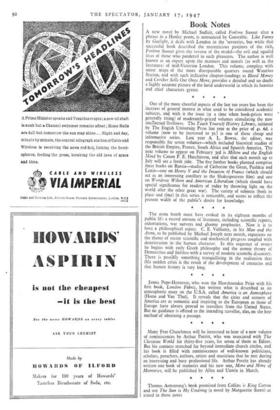Book Notes
A NEW novel by Michael Sadleir, called Forbrn Sunset after a phrase in a Henley poem, is announced by Constable. Like Fanny by Gaslight, it deals with London in the 'seventies, but while that successful book described the meretricious pastimes of the rich, Forlorn Sunset gives the reverse of the medal—the evil and squalid lives of those who pandered to such pleasures. The author is well known as an expert upon the manners and morals (as well as the literature) of mid-Victorian London. This volume, complete with street maps of the more disreputable quarters round Waterloo Station, and with such indicative chapter-headings as Blood Money and Crocker Sells Out Once More, provides a detailed and no doubt a highly accurate picture of the lurid underworld in which its heroine and chief characters gyrate.
* *
One of the more cheerful aspects of the last ten years has been the increase of general interest in what used to be considered academic subjects, and with it the issue (at a time when book-prices were generally rising) of moderately-priced volumes stimulating the new intellectual liveliness. The ,Teach Yourself History Library, initiated by The Engish University Press last year at the price of 4s. 6d. a volume (now to be increased to 5s.) is one of these cheap and informative series. Last year A. L. Rowse, the editor, was responsible for seven volumes—which included historical studies of the British Empire, France, South Africa and Spanish America. The next volume to appear on February 3rd is Milton and the English Mind by Canon F. E. Hutchinson, and after that each month up to July will see a fresh title. The five further books planned comprise three books on Russia—studies of Catherine the Great, Pushkin and Lenin—one on Henry V and the Invasion of France (which should act as an interesting corollary to the Shakespearean film) and one on Woodrow Wilson and American Liberalism (which should have special significance for readers of today by throwing light on the world after the other great war). The variety of subjects (both in place and time) in this series is noticeable, and seems to reflect the present width of the public's desire for knowledge.
The atom bomb must have evoked in its eighteen months of public life a record amount of literature, including scientific reports, exhortations, war surveys and gloomy prophecies. Now it is to have a philosophical aspect. C. E. Vulliamy, in his Man and the Atom, to be published by Michael Joseph next month, expatiates on the theme of recent scientific and mechanical prcgress coupled with deterioration in the human character. In this sequence of essays he begins with early. Greek philosophy and the atomic theory of Democritus and finishes-with a survey of modern scientific discovery. There is possibly something tranquillising in the realisation that this sudden crisis is the result of the development of centuries and that human history is very long.
* * James Pope-Hennessy, who won the Hawthornden Prize with his first book, London Fabric, has written what is described as an atmospheric essay on the U.S.A. called America is an Atmosphere (Home and Van Thal). It reveals that the cities and scenery of America are as romantic and inspiring to the European as those of Europe have always proved to travellers from the United States. But no guidance is offered to the intending traveller, alas, on the best method of obtaining a passage.
* * * Many Free Churchmen will be interested to hear of a new volume of reminiscences by Arthur Porritt, who was associated with The Christian World for thirty-five years, for seven of them as Editor. But his contacts stretched far beyond immediate church circles, and his book is filled with reminiscences of well-known politicians, scholars, preachers, authors, artists and musicians that he met during an interesting and busy professional life. Arthur Porritt has already written one book of memoirs and his new one, More and More of Memories, will be published by Allen and Unwin in March.
* * Thomas Armstrong's book promised from Collins is King Cotton and not The Sun is My Undoing (a novel by Marguerite Steen) as stated in these notes


































 Previous page
Previous page